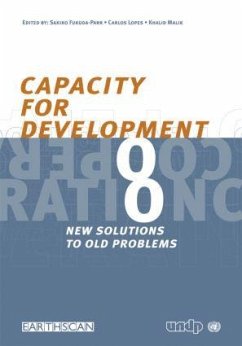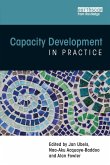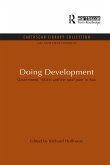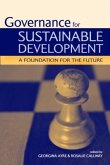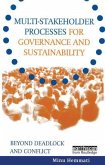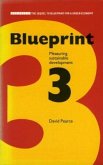- Broschiertes Buch
- Merkliste
- Auf die Merkliste
- Bewerten Bewerten
- Teilen
- Produkt teilen
- Produkterinnerung
- Produkterinnerung
Leading experts consider how development programs can increase the levels of knowledge, skill, technical know-how and productive capacity of populations in the South. The volume is organized into three parts on ownership, institutional capital and knowledge networks. They explore the participatory empowerment that builds capacity, a framework enabling social forces to contribute, and a new paradigm of knowledge in the network age. The result shows how, in future productivity, capacity development through technical cooperation can be successfully pursued.Contributors include Sunil Chako, Steve…mehr
Andere Kunden interessierten sich auch für
![Capacity Development in Practice Capacity Development in Practice]() Capacity Development in Practice50,99 €
Capacity Development in Practice50,99 €![Doing Development Doing Development]() Richard HollowayDoing Development60,99 €
Richard HollowayDoing Development60,99 €![Governance for Sustainable Development Governance for Sustainable Development]() Georgina AyreGovernance for Sustainable Development58,99 €
Georgina AyreGovernance for Sustainable Development58,99 €![Environmental Valuation Environmental Valuation]() Environmental Valuation66,99 €
Environmental Valuation66,99 €![Human Rights and the Environment Human Rights and the Environment]() Human Rights and the Environment58,99 €
Human Rights and the Environment58,99 €![Multi-stakeholder Processes for Governance and Sustainability Multi-stakeholder Processes for Governance and Sustainability]() Minu HemmatiMulti-stakeholder Processes for Governance and Sustainability58,99 €
Minu HemmatiMulti-stakeholder Processes for Governance and Sustainability58,99 €![Blueprint 3 Blueprint 3]() David PearceBlueprint 353,99 €
David PearceBlueprint 353,99 €-
-
-
Leading experts consider how development programs can increase the levels of knowledge, skill, technical know-how and productive capacity of populations in the South. The volume is organized into three parts on ownership, institutional capital and knowledge networks. They explore the participatory empowerment that builds capacity, a framework enabling social forces to contribute, and a new paradigm of knowledge in the network age. The result shows how, in future productivity, capacity development through technical cooperation can be successfully pursued.Contributors include Sunil Chako, Steve Denning, Sakiko Fukuda-Parr, Ruth Hill, Sanjay Lall, Carlos Lopes, Khalid Malik, Thandika Mkandawire, Raj Panday, and Joseph Stiglitz.
Produktdetails
- Produktdetails
- Verlag: CRC Press
- Seitenzahl: 296
- Erscheinungstermin: 1. Juni 2002
- Englisch
- Abmessung: 258mm x 178mm x 16mm
- Gewicht: 567g
- ISBN-13: 9781853839191
- ISBN-10: 1853839191
- Artikelnr.: 21544043
- Verlag: CRC Press
- Seitenzahl: 296
- Erscheinungstermin: 1. Juni 2002
- Englisch
- Abmessung: 258mm x 178mm x 16mm
- Gewicht: 567g
- ISBN-13: 9781853839191
- ISBN-10: 1853839191
- Artikelnr.: 21544043
Sunil Chacko is Executive Director of the Science and Conscience Foundation in Geneva. He conducts science, technology, finance and equity analysis on the medical digitalgenomics, pharmaceutical and biotechnology sectors. He has received a M. D. from Kerala University in India, a masters in public health from Harvard University and an M. B. A. from Columbia University, along with training in information technology and database/software programming. Stephen Denning was the Program Director, Knowledge management at the World Bank from 1996 to 2000. He now consults with organizations in the United States, Europe and Australia on knowledge management and organizational storytelling. David Ellerman is an adviser and speechwriter to the Chief Economist of the World Bank, previously Joseph Stiglitz and currently Nicholas Stern. His undergraduate education was in humanities at M.I.T.; he also has two masters degrees in philosophy and economics, and a Ph. D. in mathematics from Boston University. Sakiko Fukudo-Parr is currently the Director of the Human Development Report Office at the United Nations Development Programme. She is a graduate of Cambridge University, the Fletcher School of Law and Diplomacy, and the University of Sussex. Ruth Hill is a research student at the Centre for the Study of African Economies, Department of Economics, Oxford University. Juana Kuramoto is an economist and Associate Researcher at the Group of Analysis for Development (GRADE). She is a Ph. D. candidate in technology and innovation policy at the University of Maastricht, and holds a masters of science in public policy from Carnegie Mellon University. Sanjaya Lall is Professor of Development Economics at the International Development Centre and a Fellow of Green College at Oxford University. He was educated at Oxford and has been a staff member of the World Bank. Carlos Lopes has a masters in development economics from the University of Geneva and a Ph. D. in history from the University of Paris1-Pantheon-Sorbonne. He is currently the Acting Director of UNDP's Bureau for Development Policy. Khalid Malik is Director of the Evaluation Office at the United Nations Development Programme, following his assignment as UN Representative in Uzbekistan. Educated as an economist at the universities of Oxford, Cambridge, Essex and Punjab, he is presently Chair of the UN Interagency Group on Evaluation. Thandika Mkandawire is the Director of the United Nations Research Institute for Social Development (UNRISD) in Geneva. He studied economics at Ohio State University and the University of Stockholm. Gustavo Lins Ribeiro is a Professor in the Department of Anthropology at the University of Brasilia. He holds a Ph. D. in anthropology from the City University of New York. Francisco Sagasti is Director of the AGENDA: Peru programme of activities at FORO Nacional/Internacional. He holds a Ph. D. from the University of Pennsylvania and engineering degrees from the National Engineering University I Lima. Joseph E. Stiglitz holds joint professorships at Columbia University's Economics Department, School of International and Public Affairs, and Business School. Dr. Stiglitz was awarded the Nobel Prize in Economics in 2001. Swarnim Wagle is a consultant at the World Bank. Trained as an economist at the L.S.E and Harvard University, his academic interests span issues of growth, international trade, poverty and social relations.
Foreword
Editor's Acknowledgements
Overview
Part 1: Capacity and Development - Towards a Normative Framework: Technical Cooperation, Capacities and Development
Autonomy-Respecting Assistance: Towards New Strategies for Capacity-Building and Development Assistance
Technical Cooperation and Institutional Capacity-Building and Development Assistance
Technical Cooperation and Institutional Capacity-Building for Development: Back to the Basics
Civic Engagement and Development: Introducing the Issues
Social Capital and Industrial Transformation
Part 2: Ownership - Should We Mind the Gap?
Incentives, Governance and Capacity Development in Africa
Power, Networks and Ideology in the Field of Development
Part 3: Knowledge - The Network Age: Creating New Models of Technical Cooperation
Integrating Local and Global Knowledge, Technology and Production Systems: Challenges for Technical Cooperation
Technical Cooperation and Knowledge Networks
Developments in Private Sector knowledge-Based Entrepreneurship in the South
Knowledge of Technology and the Technology of Knowledge: New Strategies for Development
About the Authors
Editor's Acknowledgements
Overview
Part 1: Capacity and Development - Towards a Normative Framework: Technical Cooperation, Capacities and Development
Autonomy-Respecting Assistance: Towards New Strategies for Capacity-Building and Development Assistance
Technical Cooperation and Institutional Capacity-Building and Development Assistance
Technical Cooperation and Institutional Capacity-Building for Development: Back to the Basics
Civic Engagement and Development: Introducing the Issues
Social Capital and Industrial Transformation
Part 2: Ownership - Should We Mind the Gap?
Incentives, Governance and Capacity Development in Africa
Power, Networks and Ideology in the Field of Development
Part 3: Knowledge - The Network Age: Creating New Models of Technical Cooperation
Integrating Local and Global Knowledge, Technology and Production Systems: Challenges for Technical Cooperation
Technical Cooperation and Knowledge Networks
Developments in Private Sector knowledge-Based Entrepreneurship in the South
Knowledge of Technology and the Technology of Knowledge: New Strategies for Development
About the Authors
Foreword
Editor's Acknowledgements
Overview
Part 1: Capacity and Development - Towards a Normative Framework: Technical Cooperation, Capacities and Development
Autonomy-Respecting Assistance: Towards New Strategies for Capacity-Building and Development Assistance
Technical Cooperation and Institutional Capacity-Building and Development Assistance
Technical Cooperation and Institutional Capacity-Building for Development: Back to the Basics
Civic Engagement and Development: Introducing the Issues
Social Capital and Industrial Transformation
Part 2: Ownership - Should We Mind the Gap?
Incentives, Governance and Capacity Development in Africa
Power, Networks and Ideology in the Field of Development
Part 3: Knowledge - The Network Age: Creating New Models of Technical Cooperation
Integrating Local and Global Knowledge, Technology and Production Systems: Challenges for Technical Cooperation
Technical Cooperation and Knowledge Networks
Developments in Private Sector knowledge-Based Entrepreneurship in the South
Knowledge of Technology and the Technology of Knowledge: New Strategies for Development
About the Authors
Editor's Acknowledgements
Overview
Part 1: Capacity and Development - Towards a Normative Framework: Technical Cooperation, Capacities and Development
Autonomy-Respecting Assistance: Towards New Strategies for Capacity-Building and Development Assistance
Technical Cooperation and Institutional Capacity-Building and Development Assistance
Technical Cooperation and Institutional Capacity-Building for Development: Back to the Basics
Civic Engagement and Development: Introducing the Issues
Social Capital and Industrial Transformation
Part 2: Ownership - Should We Mind the Gap?
Incentives, Governance and Capacity Development in Africa
Power, Networks and Ideology in the Field of Development
Part 3: Knowledge - The Network Age: Creating New Models of Technical Cooperation
Integrating Local and Global Knowledge, Technology and Production Systems: Challenges for Technical Cooperation
Technical Cooperation and Knowledge Networks
Developments in Private Sector knowledge-Based Entrepreneurship in the South
Knowledge of Technology and the Technology of Knowledge: New Strategies for Development
About the Authors

